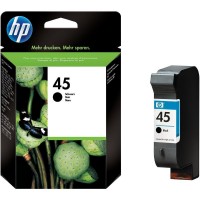The OEM is suing Datel for $30 million for supposedly cracking its inkjet cartridge chip security and sharing it with clone manufacturers.
Law360 (subscription required) reported on the trade secrets case launched by HP in the USA this Monday, which accuses Datel Holdings Ltd., whose subsidiaries “design and develop microchips for use in printer cartridges”, of “misappropriating” the OEM’s master key codes for printer cartridge chip security before sharing the codes with clone manufacturers.
The OEM is seeking $30 million (€22 millon) in damages from Datel, and adds that the company supposedly “cracked the security used on its ink cartridge microchips” before allegedly “shar[ing] the chips’ design and configuration with other companies” that make and sell cartridge chips, including some that use the chips in “clones” of HP’s 930 and 950 printers’ inkjet cartridges. HP has also accused Datel of “selling ink cartridges compatible with HP printers”.
The site notes that HP’s printers and cartridges are “designed and configured to be used with each other”, with HP stating that it uses “confidential technology” such as the master key codes used in the chips in both printers and cartridges, which allow the two products to “authenticate communication” between themselves, aiming to stop non-HP cartridges from working.
HP works with a company, STMicro, that produces development kits for customers to “develop software and generate firmware” for chips, with the kit allowing uses to access the operation of the chip, including “commands that enable or disable security features”. The kits are only given out by STMicro under “very strict confidentiality terms” such as “prohibitions on reverse-engineering and on providing the development kit to others”.
With this in mind, HP added that it “hasn’t disclosed its key codes outside HP”, with the codes a “trade secret” that help “reduce proliferation of counterfeit printer cartridges, and protect HP from improper warranty claims based on non-HP cartridges”, as well as protecting “investment of time and resources […] by ensuring that competitors do not simply ‘copy’ HP’s technology”.
As a consequence, HP claims Datel “employs a team of computer programmers, developers, designers, reverse engineers and code hackers”, and started undertaking the alleged theft in 2012 by acquiring an STMicro kit “without permission” after being refused one by STMicro. In turn, Datel then “allegedly used the kit to crack the security” on the chips, and thus figured out how to get master key codes for the 930 and 950 chips.
The OEM commented on the case by noting that it “invests billions of dollars in developing innovative products for our customers and is committed to pursuing legal enforcement to protect our brands and intellectual property, the technological innovations behind them and the value we deliver to our customers and shareholders”.
HP is seeking “preliminary and permanent injunctive relief, blocking Datel and its subsidiaries from further manufacturing or selling chips for printer cartridges that work in HP printers”. Law360 contacted Datel but were unable to get a comment.
The Recycler contacted Apex Microelectronics, Clover Technologies, Zhuhai Linlex Electronics and several other companies for their comment on the impact of this action. Jim Cerkleski, CEO at Clover Holdings, said: “We moved away from Datel months ago and only source Static chips.”
Meanwhile a statement from Apex read: “Apex Microelectronics has never had contact with Datel Holdings or with any of its subsidiaries, who have allegedly stolen codes used in HP 930 and 950 series inkjet cartridge chips.
“Apex respects the intellectual property of all printer OEMs, and follows all due diligence in developing its own technologies in the manufacture of smart chips used with printer cartridges. Apex’s studies into relative HP technologies began long before Datel’s ‘alleged theft in 2012’. All study was completed in-house, and all information needed was acquired through legal methods.”

